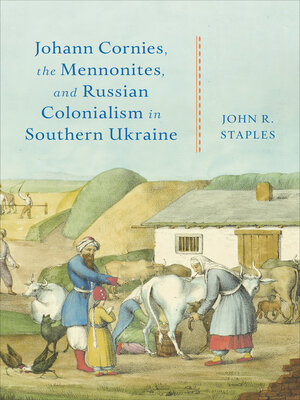Johann Cornies, the Mennonites, and Russian Colonialism in Southern Ukraine
ebook ∣ Tsarist and Soviet Mennonite Studies
By John R. Staples

Sign up to save your library
With an OverDrive account, you can save your favorite libraries for at-a-glance information about availability. Find out more about OverDrive accounts.
Find this title in Libby, the library reading app by OverDrive.



Search for a digital library with this title
Title found at these libraries:
| Library Name | Distance |
|---|---|
| Loading... |
In the late eighteenth century, the Russian Empire opened the grasslands of southern Ukraine to agricultural settlement by new colonists, among them Prussian Mennonites. Mennonite colonization was one aspect of the empire's consolidation and modernization of its multi-ethnic territory. In the colony of Molochnaia, the dominant personality of the early nineteenth century was Johann Cornies (1789–1848), a hard-driving modernizer and intimate of senior Russian officials whose papers provide unique access into events in Ukraine in this era.
Johann Cornies, the Mennonites, and Russian Colonialism in Southern Ukraine uses the life story of Johann Cornies to explore how colonial subjects interacted with Russian imperial policy. The book reveals how tsarist imperial policy shifted toward Russification in the 1830s and 1840s and became increasingly intolerant of ethnocultural and ethnoreligious minorities. It shows that Russia employed the Mennonite settlement as a colonial laboratory of modernity, and that the Mennonites were among Russia's most economically productive subjects. This microhistory illuminates the role of Johann Cornies as a mediator between the empire and the Mennonite colonists, and it ultimately aims to bring light to the history of nineteenth-century Russia and Ukraine.







